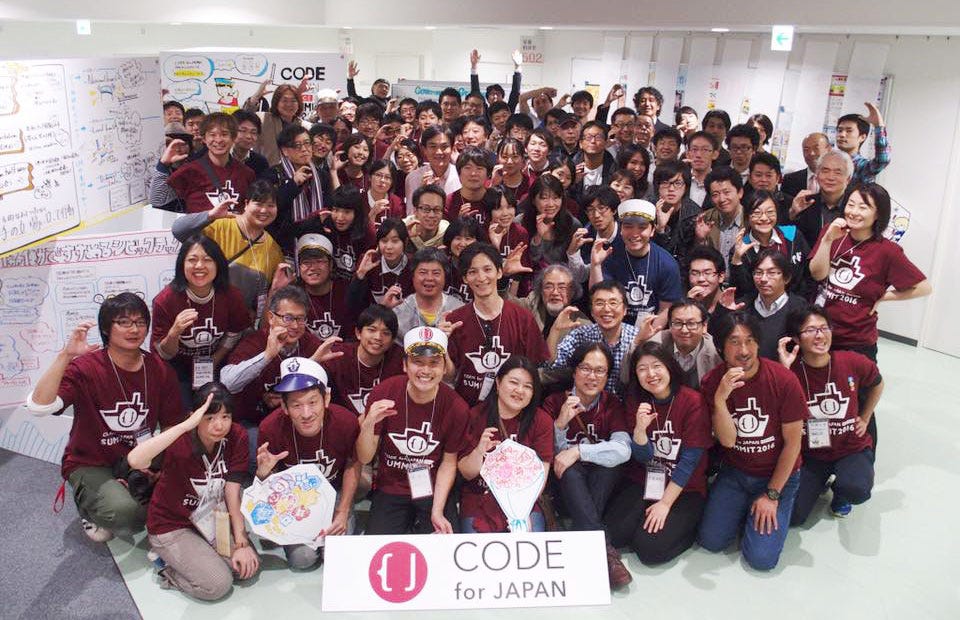How To Build A Civic Tech Community
Words by Olufemi Omotayo • Jun 26 2018
The warm clouds had begun to give way to radiant blue skies as Kazuki Jinnouchi disembarked his 40-minute train commute to the Hongo San-chome business district in Bunkyo. Attentive to Tokyo’s morning rush hour traffic, he carefully navigated his way around the lively yet tranquil area, home to Japan’s prominent universities and many tourists. His destination, the Sansho Building Hongo (office building), lay just ahead. Soon, he ascended the floors to the seventh, settled down to his tasks for the day, and began to work. As a director at Code for Japan, his hands — and tables — are always full.
About 2,000 km away in Taipei City, Min-Hsuan Wu (known mostly by his online alias, “TTcat”) was just leaving a meeting. His wasn’t quite a walk in the park. As one of the full-time paid staff of the Taiwan-based Open Culture Foundation (OCF), he had to put in an extra shift to gain necessary support for the organisation’s activities. Using socialist perspectives and horizontal connections, this experienced social worker is responsible for steering the Code for Taiwan, also known as “g0v” community. Combining expertise in creative planning, communication design and PHP programming, TTcat is a valuable resource to the community and it perhaps explains why he sometimes appears to be elusive.
Jinnouchi and TTcat, along with Christopher Whitaker in Chicago, US, and many others in different countries are part of a movement of active citizens who use technology to further democratize governance. These civic innovators are part of an advocacy initiative for more data disclosure around public contracts in the various countries of the world. In other words, they engage citizens while making government accessible to all.
Inspired By Common Causes
These activities have led to the rise of “Civic Tech,” which Whitaker, a Brigade Program Manager for @CodeforAmerica, defines as technology projects involving intentional collaboration between technologists, bureaucrats, entrepreneurs and nonprofit employees to engage the public or solve civic problems. Leading this movement is Code for All — an international network of organizations who believe that digital technology opens new channels for citizens to more meaningfully engage in the public sphere and have a positive impact on their communities.

For instance, when g0v began (pronounced as “Gov Zero”), complaints like: ‘Why is nobody doing…?’, or ‘Why isn’t g0v tracking new legislature by the government?’ usually met the response: ‘Don’t ask why nobody is doing this — because you are that “nobody”!’ Since then, members of the community have self-identified as ‘nobodys’ (沒有人). The idea is, anyone with an idea should just do it — there is no need to ask and no one to get permission from. According to TTcat, if a project discontinues, then it was probably not meant to happen. The general idea is that when a project is important people will care about it. If nobody contributes to a project, then it might not be a priority.
Civic Tech is any technology that intersects public life. Software engineer Hal Seki had always been interested in using technology to solve societal issues. He was a member of Hack for Japan, the organisation that supported the people who lived in or were evacuated from the areas that suffered from the 2011 Great East Japan Earthquake. They provided information by SMS or via cloud services to help families reconnect and resume their regular lives. Hal later met Jennifer Pahlka, the founder of Code for America and was inspired to start Code for Japan, which officially launched on 25th October 2013.
Before starting Code for America, Jennifer was left bemused by how the rest of society hurtled into new frontiers while leaving government in the “past.” She was concerned enough to do something about it — by bringing the web era into making the government work. Starting with the user, the organisation saw the need to understand those who use certain services, iterating quickly and following the data to know what works or not. It launched by focusing on health, the criminal justice system and workforce training.
Finding Friends, Making Brigades
In 2013, Typhoon Wipha caused extensive damage in several areas of Japan. From an online hazard mapping platform, Yoshikazu Kashiwazaki became Hal Seki’s Facebook friend on October 28, 2013. Prior to their meeting, he knew nothing about Code for Japan. Subsequently, however, he became a part-time volunteer in the public relations team during the Code for Japan Summit held on October 2014 and has remained a close associate of the organisation ever since.
Like Yoshikazu, friends and partners interested in Code for Japan usually know about its activities through online or offline means. Information is shared regularly on the official webpage and blog, social media, and SNS, while meetings and other community events are held often. Many times, people become friends with staff or ex-staff/volunteers of the community and become part of one of the over 40 brigades across Japan.

Brigades are local volunteer groups that bring together community members to help make government work better for everyone. They are independently active in the local areas, engaging residents in addressing their respective challenges. Code for Japan functions on a project-by-project basis with external engineers and designers at the co-working office space it occupies with other nonprofit organisations (NPOs) and social startups. Kazuki, one of the two full-time staff, works with about 15 people on a wide range of projects: reporting, finance and preparation of contracts as well as responding to inquiries from ministries, local governments and companies.
Back in Taiwan, g0v operates as a civic hacker community, having started in 2012 as a volunteer based initiative to tackle social issues like making policy processes clearer; opening government data to the public; and simplifying public information. The co-founders (who are mainly engineers) came together to “turn anger into hacker.” The growth of the g0v community is based on a culture of making things happen. It is a do-er community.
In 2014, g0v provided all web supports and digital tools as a mass protest driven by a coalition of students and civic groups (called the “Sunflower Movement”) reached a crescendo in Taiwanese government circles. That impact enhanced its popularity across the country. In a short while, members of g0v and other open source communities in Taiwan founded the OCF in order to better support the tasks of these technical communities as the legal entity. They host the g0v Summit every two years; have knowledge exchanges like the one Aiya Hsu currently partakes in her Italy base.
Openness, self-organisation and distributed responsibility are values that sit naturally within the g0v community. Many feel these make g0v different and that the community might not be so influential without this mentality. Hangouts are held every Tuesday while co-workings are on Fridays. Hackathons held every two months regularly attract over 100 people who work to come up with new ideas. Participants do not necessarily need to have technical abilities to attend. They simply share their ideas (e.g. how to better control traffic on the road to their place of abode) and ask for support from coders and developers. Communication is mostly done with online tools like Slack, Facebook etc.
Global Collaborations, Local Impact
Like Code for America’s Jennifer said, there’s a lot of opportunity to help people in our society and in the same way change how the government operates. Work areas in the U.S. include the Brigade Network, criminal justice reform and access to food. It has a mix of funding sources from foundations (Knight, Omidyar, Ford, and the Chan Zuckerberg Foundations), companies (Google, Microsoft), and individual donors (Reid Hoffman).

A fascinating fact is how countries have found ways to collaborate and exchange ideas. For instance, Hal attended the Code for America Summit from May 29–31 in Oakland, California. Remember, it was from here he was inspired to start Code for Japan, whose works cut across Local Government (local field lab, formerly called corporate fellowship program); the Brigade Community; Citizen (meeting and events like the Code for Japan Summit, etc.) and the NPOs. It helped to create the candidate database project for the election 2017 and had exchanged ideas and suggestions with mySociety to make the information on Japanese candidates more available and useful. These are also the sources from which it funds its activity.
In Taiwan, g0v influences government policies and works with Code for Japan due to proximity of the two countries. They visit each other and collaborate often. During hackathons, government officials also come to share ideas. Generally, the sessions are open to all and free to attend. They are sustained through fundraising (i.e. free donations), partnerships with academic centres and the private sectors.
The civic tech movement has shown how regular citizens can influence governance through innovations. The active participation of people like Hal, Jinnouchi and Yoshikazu (Japan); TTcat and Aiya (Taiwan); as well as Jennifer and Christopher (U.S.A.) have caused certain impacts in their respective countries. Hopefully, this would encourage more people to lend their voice and technology in making society work. The community approach seems to be effective, while Code for All provides both local and global support where necessary.



